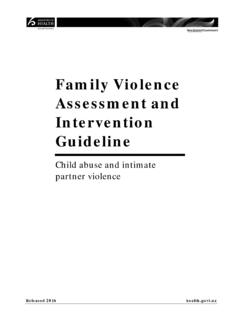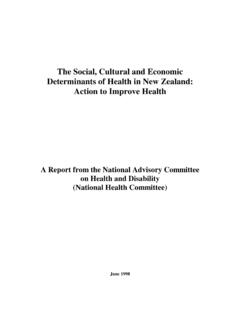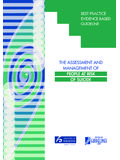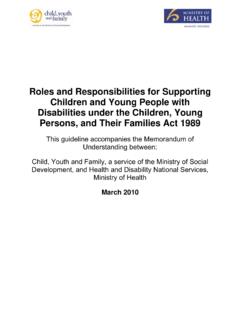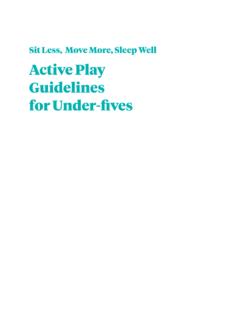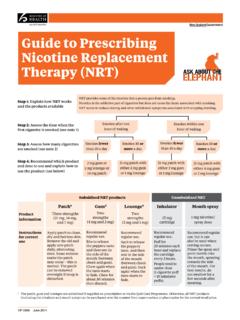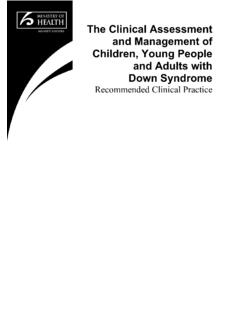Transcription of New Zealand Framework for Dementia Care - Ministry of …
1 New Zealand Framework for Dementia care Citation: Ministry of Health. 2013. New Zealand Framework for Dementia care . Wellington: Ministry of in November 2013 by the Ministry of Health PO Box 5013, Wellington 6145, New ZealandISBN 978-0-478-41500-1 (print) ISBN 978-0-478-41501-8 (online) HP 5689 This document is available at would like to acknowledge the significant time and effort contributed by the sector advisory group in developing this New Zealand Framework for Dementia care (the Framework ). The group comprised representatives from each district health board, the National Dementia Cooperative and primary health care services. We would also like to thank the following organisations for their support:Age Concern New ZealandAlzheimers AucklandAlzheimers New ZealandThe University of AucklandAuckland University of Technology (AUT)Bupa care Services New ZealandThe University of CanterburyDementia care NZDistrict health boards (DHBs)Healthcare of New ZealandIHC New ZealandKatikati Medical CentreMiranda Smith HomecareNew Zealand Association of Occupational Therapists (NZAOT)Nikau House and wellness serviceNutrition MattersRelaxed TherapyThe Royal New Zealand College of General PractitionersRyman Healthcare LtdThe Selwyn FoundationTe Hopai TrustWaitemata , we would like to acknowledge the valuable input we received from people with Dementia and their families and wh nau and would like to thank Alzheimers Auckland for coordinating the group sessions for Zealand Framework for Dementia CareForewordNew Zealand has a growing number of older people.
2 For most, their older years will be active years, with many working longer and remaining involved in their local communities. However, an increasing number of older people will also have health problems that require is a key example. As our ageing population grows, there will also be an increase in the number of people with Dementia . In 2011, just over 48,000 New Zealanders had Dementia . By 2026, it is estimated that over 78,000 New Zealanders will have This is an increase of over 60 people with Dementia will lead to an increase in costs. It is estimated that in 2011 the total financial cost of Dementia in New Zealand was $ million. This figure includes the costs of residential care , pharmaceuticals, and general practitioner visits, as well as productivity loss and the loss of healthy years of life. As the population with Dementia grows, the financial and social costs will too. So we need to be prepared. The Government is determined to make a difference in the lives of people with Dementia , their families, wh nau, friends and communities.
3 Action today will improve the wellbeing of our older people now, and prepare us for the future. In 2012 the Government provided $ million a year to district health boards (DHBs) to develop Dementia care pathways to better support people with Dementia and maximise their independence and wellbeing. The Ministry of Health has led a national project in partnership with DHBs, non-governmental organisations, people with Dementia , and other groups across the country to create a national Framework to guide the development of these pathways. The Framework aims to provide the person with Dementia with the services they need, from diagnosis to the end of life stage. The Framework encourages different health and social services to work together to provide people with integrated care . It emphasises services that take into account a person s wishes, cultural preferences and lifestyle. It also encourages health professionals to diagnose Dementia earlier to ensure people can get the help they need as soon as possible.
4 We encourage DHBs to involve all stakeholders in the development of their Dementia care pathways. It is vital that those whose lives are most affected by the journey of this disease are involved. We thank everyone who has been involved in the development of the Framework , particularly people with Dementia and their carers who so willingly provided comment and input to the fabric of the Framework . Hon Tony Ryall Hon Jo Goodhew Minister of Health Associate Minister of Health 1 Alzheimers New Zealand s Dementia Economic Impact Report 2012 Hon Tony Ryall Hon Jo GoodhewivNew Zealand Framework for Dementia CareSocialising in the communityThe Group (run by Alzheimers Whanganui) meets the social needs of people with Dementia living in the community through everyday activities, while also giving their carers some time out. The Group is finding that being out and about, using community organisations such as the museum and indoor bowling clubs, means that they are breaking down the stigmas associated with Dementia as people see the person and not their disability.
5 This photo shows two members of The Group on one of their regular outings. The ladies have no family nearby and loved the opportunity to hear and share the excitement of the young girl s story about her birthday. vNew Zealand Framework for Dementia CareContentsAcknowledgements iiForeword iiiIntroduction 1 Why the Framework was developed 1 Issues associated with Dementia 1 Purpose of the New Zealand Framework for Dementia care 3 New Zealand Framework for Dementia care 5 Principles of the Framework 7 Following a person-centred and people-directed approach 7 Providing accessible.
6 Proactive and integrated services that are flexible to meet a variety of needs 7 Developing the highest possible standard of care 8 Overarching factors 9 Education and training for people with Dementia and their families and wh nau 9 Workforce education and training 9 Readily accessible information 9 Governance 10 Family and wh nau support 10 Culturally appropriate services 10 Funding streams 11 Monitoring and evaluation 11 Advocacy 11 Key elements 13 Awareness and risk reduction 13 Assessment, diagnosis, early intervention and ongoing support 15 Assessment 15 Diagnosis 18 Early intervention and ongoing support 21 Living well 24 Meeting challenges to maximise wellbeing 31 End of life 42 Glossary 45 References and bibliography 49
7 Walking groupAlzheimers Auckland had a group of people with Dementia express an interest in walking at the Botanic Gardens, mostly because they could take their dogs and enjoy the great caf . Now the group meets every week and everyone enjoys the time they get to socialise Zealand Framework for Dementia CareIntroductionWhy the Framework was developed New Zealand has an ageing population and an increasing number of people with Dementia . In 2011, there were an estimated 48,182 New Zealanders with Dementia , an increase of 18 percent since 2008. By 2026, this number is estimated to have increased to over 78,250 (Alzheimers New Zealand 2012). The Ministry of Health (the Ministry ), together with the health and social support sector, recognises that Dementia care needs to be improved nationwide in a way that maximises the independence and wellbeing of the person with Dementia and their family and wh nau while ensuring safety and affordability of services. To this end, the Ministry has developed a national Framework for Dementia care .
8 Issues associated with dementiaThis Framework seeks to address a number of issues currently associated with Dementia . There is generally a negative social stigma associated with Dementia . Many people are afraid of being diagnosed with Dementia because they believe that nothing can be done to help them once they have been diagnosed (Alzheimer s Disease International 2012). Some health practitioners are reluctant to make a diagnosis as they feel they do not have the training to provide a diagnosis and/or are unaware of the information and support services available to increase a person s wellbeing after diagnosis (Ahmed et al 2010; Aminzadeh et al 2012). The Framework aims to improve the information available, dispel the myths about Dementia and ensure that the health and social support sectors, people with Dementia and their families and wh nau are adequately educated about the realities of Dementia and the types of support available to maximise independence and wellbeing.
9 Many people with Dementia currently receive a diagnosis from a secondary health service at a more advanced stage in their illness. A later diagnosis means that the person with Dementia often misses the opportunity to identify and communicate what is important to them because they may be no longer able to communicate their wishes and preferences. A late diagnosis can also increase stress on the person and their family and wh nau because they have not had access to the education and support services that can help them minimise or avoid symptoms of Dementia (Aminzadeh et al 2012). This can create challenges such as depression, anxiety, behavioural and psychological symptoms and carer stress. The Framework aims to encourage awareness of Dementia and reduce the stigma attached to it. It encourages people to seek an earlier diagnosis to give them the opportunity to maximise their wellbeing and identify their wishes for the future by developing an advance care plan and appointing an enduring power of , a specialist service usually diagnoses a person with Dementia .
10 However, the increasing number of people with Dementia is likely to add pressure to these specialist services. Primary health care services need to be better able to provide earlier diagnosis and appropriate care and support for people with Dementia and their families and wh nau. Primary health care practitioners need better knowledge, support and tools to have the confidence to make earlier diagnoses in the community setting (Aminzadeh et al 2012). An early diagnosis by a primary health care practitioner will free up specialist services to respond to episodic events and provide support and advice to the primary health care services in complex Zealand Framework for Dementia CarePeople who are diagnosed with Dementia often experience an uncoordinated and/or duplicated response to their care and support needs. This can cause confusion and stress for both the person with Dementia and their family and wh nau. care and support services need to be better integrated and easier to navigate through.
